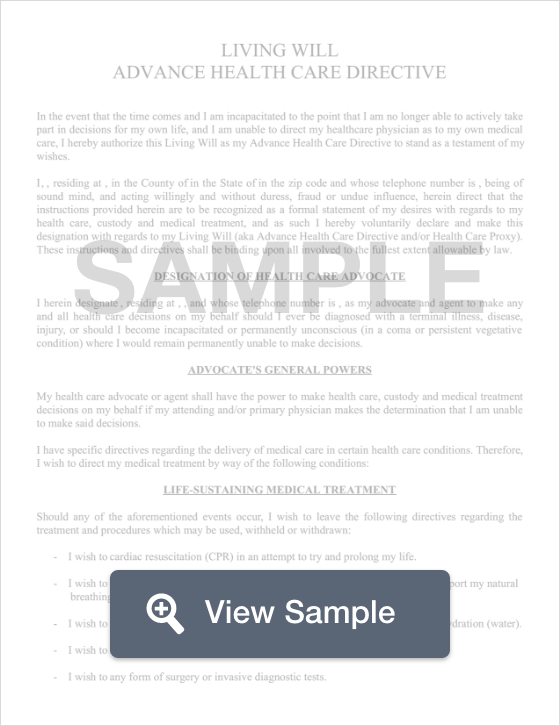What Is A Living Will?
A living will specifies a person's wishes regarding medical treatment; specifically, end-of-life treatments. This form is prepared as an advance directive—before it is needed—and it is used if you are unable to make medical decisions for yourself due to severe injury or a terminal condition. It will typically detail organ donation and any Do Not Resuscitate (DNR) order. It may also be used for people who wish to refuse certain types of medical treatment for personal or religious reasons, such as blood transfusions or life support should they fall into a coma.
Living Wills Are Also Known As:
-
Advance healthcare directive
-
Advance directive
-
Directive to medical professionals and family or surrogates
-
Instructional directive
How Can I Write My Living Will? Is It Expensive?
To write a living will, you can fill out the form online and then have it notarized. If you seek further legal advice, you may wish to visit a law firm to draft and notarize the living will. You can start a will on behalf of a parent, spouse, or other family member, then help that individual sign the will after you have drafted it.
Every state has its own state-specific requirements for a living will. Regardless of the state you live in, it's recommended to have your living will signed by at least one witness and/or a notary public to reinforce its legitimacy.
With FormSwift, you can create a living will and other specific forms for a low cost. It’s not hard and doesn’t take long, but you’ll need to know the answers to the questions below.
What Is Typically In A Living Will?
-
Whether a doctor or attending physician should perform CPR if your heart stops beating
-
Whether you should be placed on and/or kept on life support or life-sustaining treatment if in a coma
-
Whether you want artificial nutrition if you cannot eat or drink on your own
-
Whether you want dialysis if your kidneys fail
-
Whether you want antibiotics or antiviral medications to treat infections
-
Whether you want to die naturally or receive comfort care
-
Whether you want to receive care in a nursing home, at home, or in another care facility
-
Whether you want to donate your body to medical research and study
Why Should I Create A Living Will?
Every legal adult should have a living will. It makes sure that your wishes are honored in the case that you can no longer make your own medical decisions. This also reduces stress on your family and loved ones.
You should consider encouraging other family members to create a living will as well. This can be a difficult conversation. Here are a few suggestions on how to sensitively raise the topic.
-
“If something happens to you, I want to make sure I honor your wishes. Do you have a living will?” If they say that they do not, ask if they’ve considered creating one.
-
“If you’re ever on life support, I’m not sure I would be in the right frame of mind to make medical decisions on your behalf that would honor your wishes. I think it would give us both some relief if you outlined what you want in a living will.”
What Happens To My Living Will After Death?
Living Wills have no effect after death. Their purpose is to ensure that you receive the care you want while you are living and unable to make your own medical decisions.
What Is The Difference Between A Living Will And A Power Of Attorney?
A Power of Attorney form provides authority to another person to make decisions, such as healthcare choices, on your behalf. This can include managing your finances or business and estate planning.
What Is The Difference Between A Living Will And A Last Will And Testament?
A Last Will and Testament dictates the terms by which your assets are distributed upon your death. It takes effect after death, while a living will focuses on care prior to death.
Download a PDF or Word Template
Living Will
A Living Will establishes your wishes in relation to medical treatments in the event of your being unable to express your preferences for treatments, or withdrawal thereof. It establishes in advance your best interests and opinions in relation to quality of life, thus minimising differences of opinion amongst loved ones to whom the decisions would otherwise fall.
 Read More
Read More
Power of Attorney
A power of attorney is used to name another person to take care of your personal or business affairs. These documents can be temporary, such as when a member of the military is deployed overseas, or they can be permanent.
 Read More
Read More
Health Care Proxy
A Health Care Proxy allows you to arrange for your preferred health care treatments to be pre-arranged in the unfortunate circumstances of your becoming unable to express your wishes. It legally authorizes your preferred appointed person to make choices on your behalf and protect your interests.
 Read More
Read More
Medical Consent
A Medical Consent Form legally protects a vulnerable person, such as a child, elderly or disabled person and ensures they receive appropriate treatement when needed in the absence of a key care giver. It protects the treatment provider by giving them the right to carry out appropriate treatments.
 Read More
Read More

